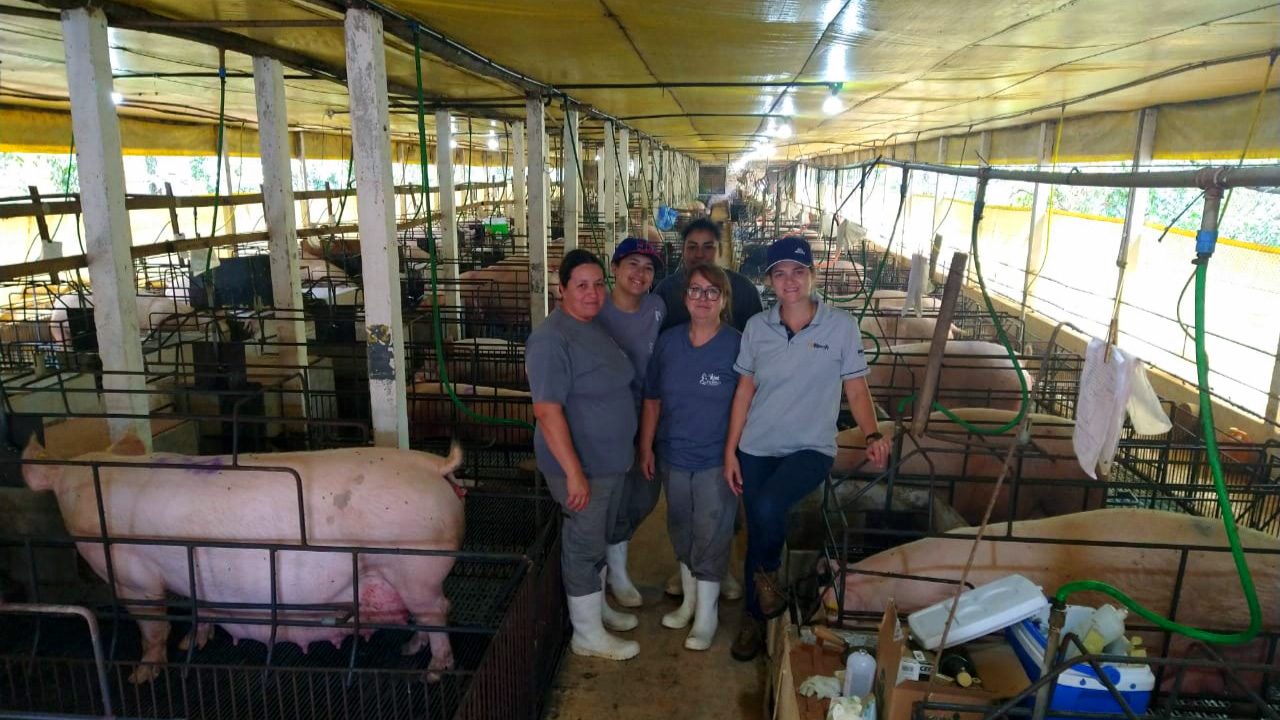

Investment in clean energy via UNIDO's Brazil biogas project
11 March 2022 Charles Arthur

The Kist and Froelich pig farm, located in the southern Brazilian state of Rio Grande do Sul, is a pioneer in the use of organic waste from animals to produce energy. The waste produced by the pigs is used to generate biogas, which is then burnt to power a generator that supplies the enterprise with electricity.
One of the farm’s business partners responsible for this success is Danieli Andrea Rambo. Since 2017, she has been working on the sustainable economic use of her farm's organic waste, using biogas to supply her business with energy and using the organic fertilizer generated by this process to feed crops with nutrients.

Rambo explains, "Solar panels, which are very common in this region, could serve us well in terms of energy, but they would not help us with our organic waste management, which can become a problem...Pig farming produces a lot of waste and can end up polluting the environment. That is why we decided biogas was the best option.”
In hope of further modernizing the farm, Rambo and her business partner, Edson Caitano Kist, responded to a call for applications for possible investment in biogas plants in southern Brazil. The call, organized by the Brazil GEF Biogas Project, targeted biogas plants looking for investment to purchase more robust equipment or services to promote efficiency and safety gains.
In August 2021, the selection process was completed, and the Kist and Froelich farm was one of seven biogas plants selected as innovative models that can demonstrate the merits of biogas. The farm will receive US$34,300 to be used to purchase a new generator, powered by biogas, which will allow the farm to be completely self-sufficient in terms of electricity, and to improve the process of separating the liquid and solid parts of the organic waste so as to provide better quality fertilizer.
Rambo explains, “Our goal is to have more energy with a new generator, and to sell good quality fertilizers. After processing, the solid part of the swine manure can be used to fertilize crops, which means we can sell it as a product to other farms in the region. And the liquid part of the manure, after processing, can be used to wash the pigsties.”
The Brazil GEF Biogas Project, which ran the investment bidding exercise, is implemented by the United Nations Industrial Development Organization (UNIDO), funded by the Global Environment Facility (GEF), coordinated by Brazil's Ministry of Science, Technology and Innovation, and executed by the International Centre for Renewable Energies (CIBiogás).
The project aims to develop the biogas value chain in Brazil and to convert organic waste into electric power, thermal energy, and fuel for transportation. It also aims to promote employment and innovation by assisting agro-industry ventures in the south region of Brazil.
As a successful businesswoman in Brazil's biogas production sector, Rambo is aware of the challenges in terms of gender equality. “When I worked in the grain sector, it was also a male-dominated work environment. In the farming sector, it is no different: salespeople, technicians, veterinarians, most professionals I encounter everyday are men. It is a very masculine sector. But I am not concerned,” she says. “I always work to make people value me as a competent professional, a competent entrepreneur. That is my strength as a woman, and that is how I know women will succeed in this sector”.
The farm employs 24 people, working with 2,100 female pigs. After a gestation period of around four months, each pig gives birth to an average of 15 piglets. These are weaned after around 23 days and kept until they reach a weigh of 23 kilos, when they are sold.
According to the Brazilian Biogas Association (ABiogás), Brazil has the greatest biogas potential in the world. However, data from ABiogás and from CIBiogás shows that Brazil has only 521 biogas plants and only exploits 2% of its total biogas potential. Biogas could supply up to 36% of Brazil’s national electricity demand or cover 70% of its diesel oil consumption.
Brazil is also the fourth biggest consumer of biofertilizer in the world and currently imports 65% of the biofertilizer it uses. If biogas – and therefore bio-digestate (the nutrient-rich substance produced by anaerobic digestion) – production increased, it would represent a market opportunity for local companies.
At present, around three million cubic metres of biogas are produced in Brazil every day. ABiogás and CIBiogás estimate that, if the potential for biogas production from agriculture, the sugar sector, and urban solid waste were fully exploited, the country could generate up to 82 billion cubic metres of biogas each year.
See:
Brazilian stakeholders of UNIDO-GEF project trained on biogas